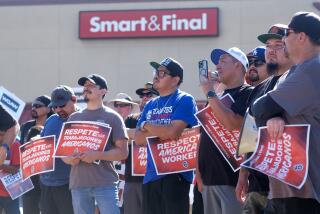PennySaver had been in financial distress for months before closure

PennySaver workers are suing OpenGate in state and federal court, alleging that the company failed to provide adequate notice about the shutdown. Above, workers attend a May 26 meeting.
Coupon mailing company PennySaver USA was in default on its main operating loan for five months before it abruptly shut down on the eve of the Memorial Day weekend, something few of its roughly 680 employees knew before they were put out of work.
The owner, private equity firm OpenGate Capital in Century City, had turned over management of the firm in December to a restructuring and liquidation company, Realization Services Inc. in Bedford Hills, N.Y.
And in the two months before the shutdown, the lender, a unit of Capital One Financial Corp., had placed one and sometimes two representatives at PennySaver’s Brea headquarters to monitor the operation and the company’s financial condition, under terms of the line of credit it was using to pay employees, among other expenses.
The default, the hiring of the restructuring firm and the lender’s presence on site paint a picture of a company in financial distress, the kind that former employees allege should have prompted OpenGate to provide a federally required 60 days’ notice before closing the plant.
Through it all, few employees understood the depth of the company’s distress. Workers are suing OpenGate in state and federal court, alleging it failed to provide adequate notice to workers about the shutdown and issued final paychecks that bounced.
------------
FOR THE RECORD
June 18, 10:39 a.m.: An earlier version of this article and an accompanying photo caption reported that PennySaver workers were suing OpenGate Capital and its managing partner, Andrew Nikou. Nikou was not named as a defendant in the suit.
------------
“It’s not like they didn’t know they had to give 60 days’ notice, and it’s not like they didn’t know there were some significant financial issues,” said Richard McCune, a Redlands lawyer who filed a lawsuit seeking class-action status on behalf of former employees.
Elaine Buckley, a former senior vice president for sales and a 35-year employee, said she believes the company was in “liquidation mode” for months.
Barry L. Kasoff, president of Realization Services who served as PennySaver’s chief restructuring officer, denied the assertion and said the decision to close with little notice was dictated by Capital One.
“That would be a hard argument to make,” he said. “The company was starting to be profitable. We had paid down the loan.... If we wanted to liquidate the company it would be done by now. Why would we put in all that effort?”
Kasoff, making the first extended comments on behalf of PennySaver since its closure, said the default was technical and that the company was paying down the loan.
Financing terms required PennySaver to meet certain financial goals and maintain various debt ratios at certain levels. Not meeting those goals or maintaining those levels would result in a default regardless of whether loan payments were made.
“It’s not a good sign, obviously,” Kasoff said of the default. “But it’s not like the world’s coming to an end.... Most of my clients are in default. You get out of default.”
Kasoff said that his sole focus after his company was brought in was on fixing PennySaver and that a shutdown was never contemplated until Capital One shut off credit without explanation.
He said that cost cuts and other moves had pushed PennySaver back toward profitability by May and the company was nearing the end of negotiations to refinance the line of credit or sell the company when Capital One stopped returning the company’s calls.
Kasoff said that the bank explicitly forced the default when, on the last day of operations, a bank representative phoned to say that the bank would not advance the $400,000 needed to fund corporate payrolls unless PennySaver agreed to shut down and dismiss all employees not needed to wind down the company.
“If we wanted the employees to be paid, we had to immediately terminate all the employees other than those that were needed to liquidate,” Kasoff said. “I’ve been doing this over three decades. You always pay your employees. Banks don’t do this.... Every major bank in the U.S. covers the payrolls.”
Capital One spokesman Michael Bulger said: “Withdrawing funding is a last resort. We work with every customer to find a workable solution, but unfortunately we weren’t able to reach an agreement in this situation.” He declined to comment further.
Nikou and OpenGate executives wouldn’t discuss PennySaver’s closing.
OpenGate, which acquired PennySaver in 2013, specializes in buying units of larger companies and reselling them. Its website says its businesses generate annual revenue of about $3 billion, making it a small player.
Nikou, its founder, is a board member at the Hammer Museum and, until recently, at the Museum of Contemporary Art. He was born in Vancouver, attended USC’s business school and then took a job at Los Angeles private equity firm Platinum Equity in its Paris office, according to OpenGate’s website.
OpenGate, which Nikou started in 2005, has engaged in more than two dozen transactions. Among them were a French children’s book publisher, a Finnish paper producer, the Nicole Farhi division of fashion firm French Connection and Models One Ltd., the modeling agency that has represented supermodels Bar Refaeli, Alessandra Ambrosio, Linda Evangelista and others.
OpenGate has had successes. It bought Gabriel Ride Control, a shock absorber maker losing $20 million a year, returned it to profitability and preserved 1,400 jobs before selling it in 2012.
OpenGate is perhaps best known for its 2008 purchase of the print version of TV Guide for a nominal price plus assumed debt. It said the once-popular magazine was losing money and is now profitable.
But not all OpenGate deals have worked out.
In January 2013, for instance, OpenGate abruptly shut down Golden Guernsey Dairy in Waukesha, Wis. It had about 100 workers, some of whom arrived at the plant one January morning to find the gates locked, according to state documents.
An investigation by the state’s Department of Workforce Development in 2013 cited the dairy for violating a federal law requiring a 60-day warning of mass layoffs and said it owed workers $1.6 million. A state claim for wages was filed in the dairy’s pending Delaware bankruptcy case.
A bankruptcy trustee subsequently alleged in a court filing that Nikou and OpenGate had obtained the company at a “bargain purchase” price when the fair value of assets exceeded liabilities by $10.9 million.
The trustee, Charles Stanziale, said OpenGate “made no net investment” in the dairy after its initial purchase and the “value was consistently eroded” over the months leading to bankruptcy. Stanziale alleged that the dairy was insolvent in December 2011, more than a year before the hurried shutdown.
OpenGate has said that it boosted sales at the plant by 20%, but that the shutdown was forced by creditors and others who refused to make concessions on contracts that were not sustainable. In court papers, the company said the trustee’s allegations are without merit.
Last year, an OpenGate portfolio company called Fusion Paperboard in Sprague, Conn., shut down, eliminating 145 jobs and defaulting on the $1.8-million balance of a state-subsidized loan, according to the state Department of Economic and Community Development. Catherine A. Osten, Sprague’s first selectman, the equivalent of mayor, said the company owes more than $240,000 in back taxes.
Kasoff, who also handled the Connecticut plant for OpenGate, said Fusion acted properly in all respects in selling some assets to a competitor and said it retains ownership of its real estate and other assets, which it will sell to pay off creditors.
This spring, Hamilton Scientific, a De Pere, Wis., lab equipment maker owned by OpenGate, abruptly shut down, laying off 80 people there and 190 at plants in Texas and Arkansas without notice, according to a lawsuit filed by former employees.
The Hamilton shutdown was the result of a dispute in which the landlord of its main plant in Texas moved to evict the firm, imperiling the business, according to an OpenGate spokesman.
The spokesman, who did not want to be identified because of pending litigation, said the company warned workers about the possibility of a plant closure when it learned of the eviction threat.
More to Read
Inside the business of entertainment
The Wide Shot brings you news, analysis and insights on everything from streaming wars to production — and what it all means for the future.
You may occasionally receive promotional content from the Los Angeles Times.











